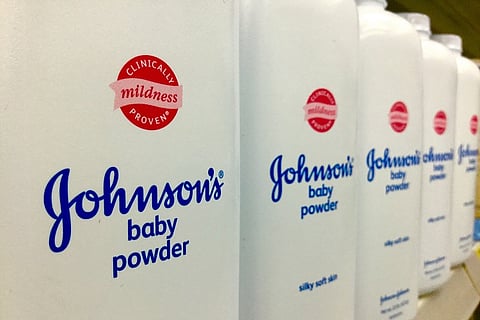

On Monday, page 3 of the Times of India carried a half page ad. “Your Johnson’s baby powder is pure, safe & gentle” the title read, along with the declaration that government lab tests confirmed that the talcum powder was asbestos-free. “This conclusion reinforces the findings of decades of independent tests by universities, research labs and government regulators around the world that have consistently found our talc is safe,” the ad read.
This ad, the second of its kind in India, comes days after the first one appeared in the Mumbai edition of TOI on March 2. Shortly before, on February 28, the Central Drugs Standard Control Organization (CDSCO) had allowed the company to resume production of the baby powder at its Indian plants in Mulund, Mumbai and Baddi, Himachal Pradesh. This came after a government lab in Chandigarh found samples from these factories to be of “standard quality” and free of asbestos, a carcinogen.
The ad that appeared in TOI Bengaluru
A company spokesperson told TNM that the idea behind the two ads was to reinforce what the government lab tests had found, and what Johnson and Johnson had been claiming for the past 130 years – the talcum powder is safe and asbestos-free.
In a statement that the company released on February 28, Johnson & Johnson had announced the lab results. The advertising, the company spokesperson said, was a secondary step to inform their consumers they need not worry about safety.
The statement had added, “We stand behind the safety of our talc, which is routinely tested by both suppliers and independent labs to ensure it is free of asbestos.”
“In recent months, regulatory authorities from Singapore, Thailand, Saudi Arabia, Jordan, Kuwait, and Egypt have also reaffirmed the purity of Johnson & Johnson’s talc,” it added.
Johnson & Johnson had suffered a huge setback in December last year, after a Reuters reported that the company was facing thousands of lawsuits alleging that its talc caused cancer. According to that report, from 1971 to the early 2000s, the company’s raw talc and finished powders had sometimes been found to have small amounts of asbestos. Johnson & Johnson’s executives allegedly knew this, but they did not disclose it to the FDA or to the public.
The company denied all allegations. Its litigators told jurors that the records of the asbestos presence detected in talc was in the product intended for industrial use. In other cases, the company argued that the tests had picked up the carcinogen in the background like stray fibres that may have originated from elsewhere and contaminated the samples.
One case out of the thousands that came up against Johnson & Johnson in this regard stood out. In July 2018, in St Louis, Missouri in the US, 22 plaintiffs won the case against the company. They had argued that the company’s Baby Powder and Shower to Shower Talc was tainted with asbestos and had caused them to develop ovarian cancer. The jury had ordered J&J to pay the plaintiffs $4.67 billion to the women in damages. As of December 2018, the company had failed to overturn this jury verdict.
With the number of cases against their talc piling and this verdict, J&J's public image suffered. Its shares plummeted by 11% after the Reuters report, the worst drop seen in over a decade.
In India, CDSCO ordered the company to stop manufacturing its baby powders using raw materials until further tests proved it was asbestos-free, two days after the Reuters report was published. Its sales in India were affected too, a first since 2002. J&J reportedly controls three-fourths of India’s baby care market.